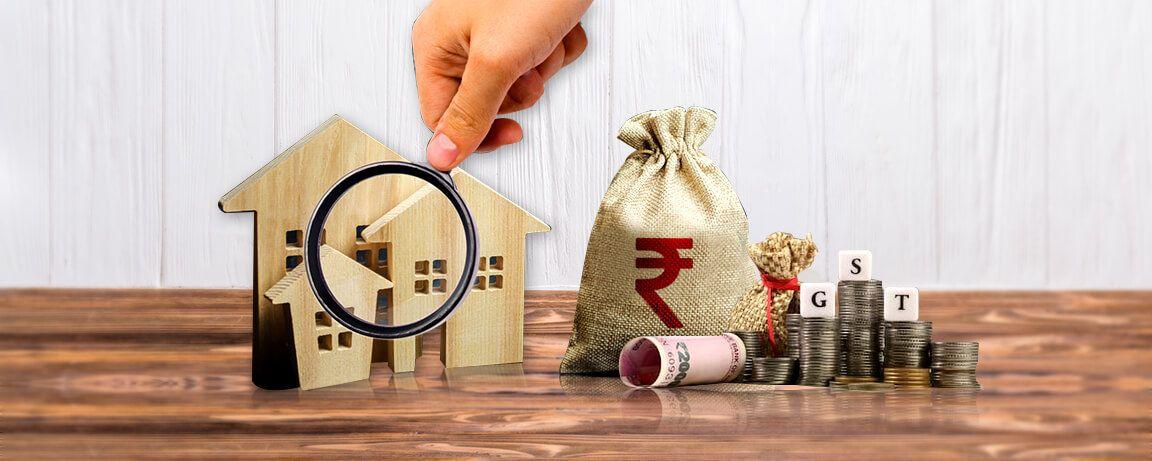Your handy guide on GST on Home Loan
Buying a Home is nothing less than a financial milestone in one’s life. Of course, in most cases, this feat cannot be achieved without the much-needed financial aid, provided by Home Loans. A mortgage product benefits the home buyer in more than one ways, one of them being Home Loan tax benefits.
However, GST is applicable on your Home Loan. So, let’s find out how the newly implemented GST affects your Home Loan.
GST and its Impact on Home Loans
To begin with, it is important to understand that GST has been introduced as a measure to replace multiple indirect taxes such as Central Excise Duty, Commercial Tax, Octroi Tax, Service Tax, VAT and other local taxes.
Now, let us take a look at the components pertaining to a Home Loan to better understand the implication of GST on your Home Loan:
Interest on the loan amount – Doesn’t attract any tax
Stamp Duty – Doesn’t attract any tax
Home Loan Services (Processing Fee, Advocate Fee, Valuations Charges, etc.) – Attract a GST of 18%
Prepayment Fee under MCLR – Doesn’t attract tax
Prepayment Fee for Fixed Rate Home Loan – Attracts a GST of 18%
Late Payment or Default on EMI – Will attract a GST of 18%
Before the implementation of GST services like Loan Processing, Property Valuations, Late Payment, etc. attracted a service charge of 15%, which has now been increased to 18%. As you may guess, this 3% increase will lead to a marginal rise in the overall cost of a Home Loan.
For instance, if you are seeking a Home Loan of Rs. 50 Lakh and your lender levies a processing fee of 1.5% on the loan amount, then,
Processing Fee = 1.5% of 50 lakhs = Rs. 75,000
Before GST = 15% (service tax) on Rs 75,000 = Rs. 11,250
After GST = 18% on Rs 75,000 = Rs. 13,500
Marginal Increase in Processing Fee = Rs. 2,250
Considering a loan amount of Rs. 50 Lakh, an increase of Rs. 2,250 seems too nominal. That being said, the increase cannot be completely ignored, since there are numerous other heads which attract GST as discussed above.
GST on Real Estate Property
Next, let’s take a look at GST on Under-Construction Properties and Ready to Move In Properties.
GST on Under-Construction Properties
As per an earlier directive, GST of 18%, i.e., 9% SGST + 9% CGST was applicable on under construction properties. In addition, the government allowed for a deduction of land value equal to 1/3rd of the total amount charged by a developer, thereby bringing down the effective rate to 12%.
At that point, the impact of GST largely varied on the basis of the stage of construction of the property. If the project was on the early stage of development, more benefits could be passed on, as compared to a project in which the majority of the construction was already complete. Hence, if the construction of an apartment was less than 50% complete at the time of implementation of GST, the homeowner would have to pay a lesser amount to the builder, thereby ensuring a lower Home Loan amount, which benefited a large number of new home buyers.
This was however changed as, on 19th March 2019. The GST Council approved a transition plan for the new tax structure for residential units. The council suggested that the residential projects which are incomplete as on March 31, 2019 – can either stick to the old structure with 8% or 12% with Input Tax Credit or make a switch to the new structure with 5% and 1% rates, without Input Tax Credit.
For new projects, where the construction begins on or after April 1, 2019, the new tax rates of 1% for affordable houses and 5% for others, without ITC, will be applicable.
Additional Info: Also Apply for Home Construction Loan
GST on Ready-To-Move-In Properties
As per the GST Council, if the occupancy certificate of a new property has been received from the developer, then, no GST will be applicable on the same. As can be easily understood, this will effectively reduce the tax burden on the home buyer.
Impact of GST on Home Loan EMI
This will largely depend on the time of the purchase of the house, as well as the stage of construction that the house is in. If the overall cost of the house goes up due to these factors, the cost of Home Loan will see a hike as well. Besides, the marginal increase in taxation on loan services will also lead to an overall increase in the cost of the Home Loan, thereby contributing to the rise in EMI to a certain extent.
We hope that you now know all that there is to about the impact of GST on Home Loans. This knowledge will prove to be of great help to you when you set foot to buy a new home, as well as when you approach a lender for availing a Home Loan.
Also Read: Planning to Purchase a Property in India? Learn more about GST Rates
To apply online for Credit Cards, Secured Loans and Unsecured Loans, visit www.mymoneymantra.com, the leading online lending marketplace that offers financial products from 100+ Banks and NBFCs. We have served 7 million+ happy customers since 1989.


